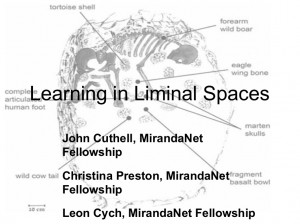Learning in Liminal Spaces
- Learning
- Beyond Collaborative Learning
- From practice to praxis
- ICT CPD Landscape Review
- ICT delusions: Plus Ça Change?
- Is teaching a technology, or is it more than that?
- Learning in Liminal Spaces
- Learning in Liminality
- MirandaMods
- Online forums as resources for teacher professional development
- A Learning Community
- The Role of Web-based Communities in Teacher Professional Development
- A City Learning Centre
The informal dynamic knowledge creation in collaborative contexts occurs as participants move from textual debate in a conventional mailing list to video conferencing, micro blogging contributions and collaborative concept maps. This collaborative technology can be seen as creating a liminal space – a passage, in which a person moves from one state of being to another. Participants in this liminal space are transformed by acquiring new knowledge, a new status and a new identity in the community. This change is of critical importance if learning is to be successful. Whilst remote and informal learning is largely is what has been understood about mobile learning, the concept can now be extended to include these informal spaces in which learning takes place – the liminal spaces that those who push the boundaries of digital possibilities now inhabit intellectually (Cuthell, Preston, Kuechel and Cych, 2009).
This paper aims to extend understanding of liminal spaces and their contribution to the learning process. Evidence from participants from the United Kingdom, Europe, West Africa, the United States and Australasia is used to estimate the value of such informal learning for professionals. The qualitative and quantitative research tools that record both the numbers involved in the different activities, levels of participation and the extent of the professional knowledge created are identified. The processes can be described as Bricolage (Levi Strauss, 1962), in which people build new knowledge from what is at hand. Some consideration will be given to the long-term impact of building professional knowledge in a range of media that are not subject to conventional peer review. Finally the advantages and disadvantages of informal learning against formal learning will be summarised.
Learning in Liminal Spaces
